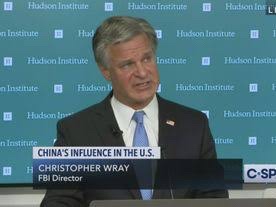
Director Wray Discusses Threat Posed By China to U.S. Economic and National Security
It’s the people of the United States who are the victims of what amounts to Chinese theft on a scale so massive that it represents one of the largest transfers of wealth in human history.
If you are an American adult, it is more likely than not that China has stolen your personal data.
In 2017, the Chinese military conspired to hack Equifax and made off with the sensitive personal information of 150 million Americans
—we’re talking nearly half of the American population and most American adults—
and as I’ll discuss in a few moments, this was hardly a standalone incident.
Our data isn’t the only thing at stake here—so are our health, our livelihoods, and our security.
China-related counterintelligence
We’ve now reached the point where the FBI is opening a new China-related counterintelligence case about every 10 hours.
Of the nearly 5,000 active FBI counterintelligence cases currently underway across the country, almost half are related to China. And at this very moment,
China is working to compromise American health care organizations, pharmaceutical companies, and academic institutions conducting essential COVID-19 research.
Chinese students and researchers
Every year, the United States welcomes more than 100,000 Chinese students and researchers into this country. For generations,
people have journeyed from China to the United States to secure the blessings of liberty for themselves and their families—and our society is better for their contributions.
So, when I speak of the threat from China, I mean the government of China and the Chinese Communist Party.
A Diverse and Multi-Layered Approach
The second thing the American people need to understand is that China uses
a diverse range of sophisticated techniques—everything from cyber intrusions to corrupting trusted insiders.
They’ve even engaged in outright physical theft. And they’ve pioneered an expansive approach to stealing innovation through a wide range of actors—including not just Chinese intelligence services but state-owned enterprises,
ostensibly private companies,
certain kinds of graduate students researchers, and a whole variety of other actors working on their behalf.
Economic Espionage
To achieve its goals and surpass America, China recognizes it needs to make leaps in cutting-edge technologies.
But the sad fact is that instead of engaging in the hard slog of innovation, China often steals American intellectual property
and then uses it to compete against the very American companies it victimized—in effect, cheating twice over.
They’re targeting research on everything from military equipment to wind turbines to rice and corn seeds.
Thousand Talents Program
Through its talent recruitment programs, like the so-called Thousand Talents Program,
the Chinese government tries to entice scientists to secretly bring our knowledge and innovation back to China
even if that means stealing proprietary information or violating our export controls and conflict-of-interest rules.
scientist Hongjin Tan
Take the case of scientist Hongjin Tan, for example, a Chinese national and American lawful permanent resident.
He applied to China’s Thousand Talents Program and stole more than $1 billion—that’s with a “b”—
worth of trade secrets from his former employer, an Oklahoma-based petroleum company, and got caught. A few months ago, he was convicted and sent to prison.
the case of Shan Shi
Or there’s the case of Shan Shi, a Texas-based scientist, also sentenced to prison earlier this year.
Shi stole trade secrets regarding syntactic foam, an important naval technology used in submarines.
Shi, too, had applied to China’s Thousand Talents Program, and specifically pledged to “digest” and “absorb” the relevant technology in the United States.
He did this on behalf of Chinese state-owned enterprises, which ultimately planned to put the American company out of business and take over the market.
In one of the more galling and egregious aspects of the scheme, the conspirators actually patented in China the very manufacturing process they’d stolen, and then offered their victim American company a joint venture using its own stolen technology.
We’re talking about an American company that spent years and millions of dollars developing that technology, and China couldn’t replicate it—so, instead, it paid to have it stolen.
Hao Zhang、economic espionage
And just two weeks ago, Hao Zhang was convicted of economic espionage, theft of trade secrets, and conspiracy for stealing proprietary information about wireless devices from two U.S. companies.
One of those companies had spent over 20 years developing the technology Zhang stole.
These cases
were among more than a thousand investigations the FBI has into China’s actual and attempted theft of American technology
—which is to say nothing of over a thousand more ongoing counterintelligence investigations of other kinds related to China.
We’re conducting these kinds of investigations in all 56 of our field offices.
And over the past decade, we’ve seen economic espionage cases with a link to China increase by approximately 1,300 percent.
FBI